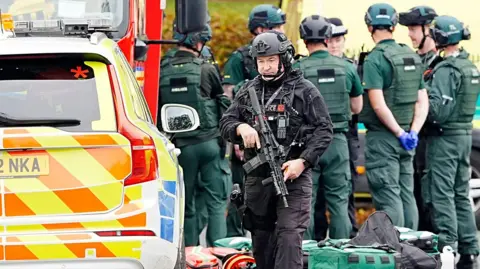Police investigating the recent attack in Manchester have confirmed that the main suspect arrived in the United Kingdom from Syria as a young child. The revelation has added new urgency to questions about immigration and security, while also deepening the debate about how best to balance compassion with public safety.
The attack, which left the city stunned earlier this week, has been described by officials as one of the most serious incidents of recent years. Counter-terrorism officers and emergency services were deployed on a large scale, with investigators working around the clock to piece together what happened and why. Authorities have not yet confirmed the precise motives of the suspect, but they are examining whether the individual acted independently or may have been influenced or supported by a wider network.
Read Also:
Police name Manchester Synagogue terror suspect
Two dead, four injured after suspected terror attack on Manchester synagogue
According to senior officers, the suspect had lived in the UK for many years after arriving with family from Syria. While details about their upbringing and life in Britain remain under investigation, officials say this information is key to understanding both their personal trajectory and the broader environment that may have contributed to the attack. Sources close to the inquiry stressed that the investigation remains in its early stages, but noted that the suspect’s history will play a central role in shaping its findings.
As part of their work, security officials are analysing the suspect’s recent activities, including digital communications, social media use, and personal connections. Police have carried out searches at multiple properties across Greater Manchester and other parts of the country, with neighbours describing a heavy police presence and forensic teams moving quickly to secure potential evidence.
The incident has already begun to spark political debate. Some lawmakers have called for a tougher approach to vetting and monitoring migrants, while others have cautioned against rushing to conclusions that could unfairly stigmatise refugee communities. Community leaders in Manchester have echoed the latter view, urging people to come together rather than allow anger to turn into division. “This is a moment for solidarity, not suspicion,” one local councillor said, warning against collective blame.
The government, meanwhile, has pledged full support for victims and their families. Officials in Downing Street described the attack as “deeply troubling” and promised that lessons would be drawn to strengthen future security measures. Prime Ministerial aides said the case would likely trigger a review of current policies relating to both counter-terrorism and refugee integration.
As Manchester holds vigils and mourns those affected, the wider nation is watching closely. For many, this case is not only about the horror of the attack itself but also about the direction Britain takes in addressing questions of security, immigration, and extremism. The choice facing the country, as some commentators have observed, is whether to allow fear to dictate policy or to seek long-term solutions that keep both justice and compassion in balance.



